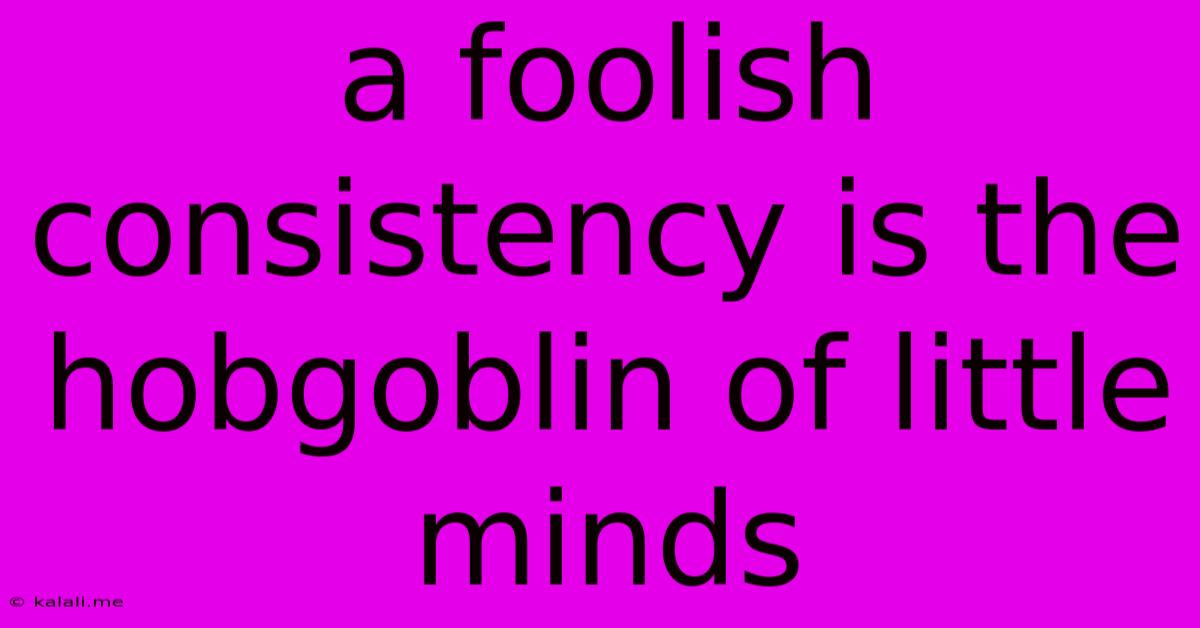A Foolish Consistency Is The Hobgoblin Of Little Minds
Kalali
Jun 07, 2025 · 3 min read

Table of Contents
A Foolish Consistency is the Hobgoblin of Little Minds: Embracing Flexibility and Growth
This quote, often attributed to Ralph Waldo Emerson, speaks volumes about the importance of adaptability and intellectual honesty. It challenges the rigid adherence to previously held beliefs and highlights the limitations of unwavering consistency, particularly when faced with new information or changing circumstances. This article will delve into the meaning of this insightful phrase, exploring its implications for personal growth, intellectual development, and navigating the complexities of life.
What does "A foolish consistency is the hobgoblin of little minds" really mean?
At first glance, the quote might seem to advocate for inconsistency or capriciousness. However, that's a misinterpretation. Emerson isn't suggesting that we abandon all principles or become erratic in our actions. Instead, he's cautioning against a foolish consistency – a stubborn clinging to beliefs or practices that are no longer relevant or beneficial. The "hobgoblin of little minds" refers to a restrictive, almost fearful, mindset that prioritizes maintaining a consistent image over genuine understanding and growth. This kind of consistency hinders intellectual exploration and prevents us from evolving as individuals.
The dangers of inflexible consistency:
- Intellectual stagnation: Rigid adherence to outdated ideas prevents us from considering new perspectives and evidence. It limits our capacity for learning and adapting to new information.
- Missed opportunities: An unwillingness to change course in the face of challenges can lead to missed opportunities for growth and success. The ability to adjust strategies and approaches is crucial in a dynamic world.
- Damaged relationships: Inflexibility can strain relationships. A willingness to compromise and understand differing viewpoints is essential for building strong and lasting connections.
- Lack of self-awareness: Stubborn consistency can mask a lack of self-awareness. It's important to be able to evaluate our beliefs and actions critically, recognizing when adjustments are needed.
Embracing flexible thinking and growth:
The key takeaway from Emerson's quote is the need for intellectual flexibility. This doesn't mean being wishy-washy or lacking conviction. Rather, it involves:
- Critical self-reflection: Regularly examine your beliefs and actions. Are they still serving you? Are they aligned with your values and goals?
- Openness to new ideas: Be willing to consider different perspectives, even if they challenge your existing beliefs. Engage in constructive dialogue and debate.
- Adaptability: Embrace change and learn from your mistakes. Be willing to adjust your strategies and approaches as needed.
- Intellectual humility: Recognize that you don't have all the answers and be willing to admit when you're wrong.
Consistency with nuance:
While foolish consistency is detrimental, a certain level of consistency is important for building trust and reliability. The key lies in discerning the difference between steadfast principles and rigid adherence to outdated practices. True consistency comes from a place of integrity and values, not from a fear of change or a need to maintain a facade.
Conclusion:
Emerson's quote serves as a powerful reminder of the importance of intellectual flexibility and adaptability. By embracing a nuanced approach to consistency, we can foster personal growth, intellectual development, and stronger relationships. The ability to evolve our thinking and adapt to new circumstances is a sign of strength and maturity, not weakness. It's a vital skill for navigating the complexities of life and achieving our full potential. So, let's shed the hobgoblin of foolish consistency and embrace the liberating power of flexible thinking.
Latest Posts
Latest Posts
-
What Does A Gas Line Look Like
Jun 07, 2025
-
Weak Air Flow From Vents In House
Jun 07, 2025
-
I Like To Read Philosophy Book French
Jun 07, 2025
-
Good Rules To Make Up For Uno
Jun 07, 2025
-
You Got To Keep Up The
Jun 07, 2025
Related Post
Thank you for visiting our website which covers about A Foolish Consistency Is The Hobgoblin Of Little Minds . We hope the information provided has been useful to you. Feel free to contact us if you have any questions or need further assistance. See you next time and don't miss to bookmark.